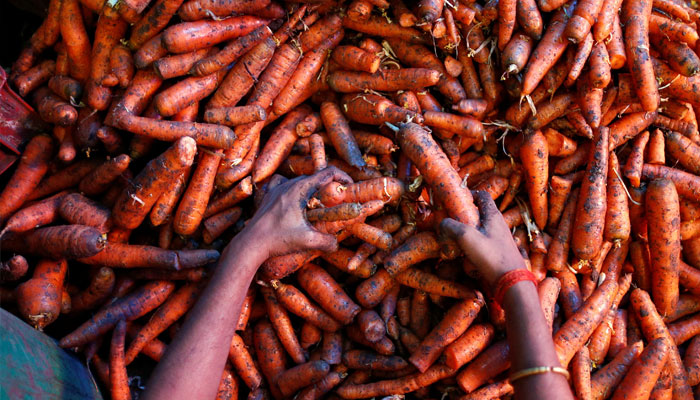Poisonous carrot weed threatens farmers, public health in Pakistan
Islamabad: Farmers in the outskirts of Islamabad are grappling with the rapid spread of Parthenium, a toxic weed locally referred to as the poisonous carrot weed.
This invasive plant is wreaking havoc on crops, degrading soil quality, and posing significant health risks to humans and animals. “This weed destroys crops, and once it infests the soil, it becomes unsuitable for cultivation. Even livestock are at risk,” a distressed farmer told this agency on Sunday.
According to recent data, around 8.6 million people in Pakistan faced food insecurity between March and June 2024. Experts warn that Parthenium could worsen this crisis. Dr Imtiaz Hussain of the Pakistan Agricultural Research Council highlighted its alarming spread: A single plant can produce 10,000 to 15,000 seeds. This can lead to a 30-40% reduction in crop yields if it infests agricultural fields.
Initially confined to rural areas, Parthenium has now spread to cities, causing allergies and health complications. When contacted Pulmonologist Dr Asadullah Naeem warned, The plant’s pollen can trigger eye and nasal allergies, causing symptoms such as redness, watering, sneezing, and itching. Direct contact can result in severe skin conditions like contact dermatitis.
Despite these dangers, Parthenium is increasingly used in floral decorations, replacing the imported baby’s breath flower. Florists, unaware of its risks, prefer it for its affordability and aesthetic appeal. “We use this weed because imported alternatives are too expensive, but handling it causes skin irritation,” said Imran Tariq, a local florist while talking to APP.
The Centre for Agriculture and Biosciences International (CABI) has been working to control the Parthenium since 2017. Abdul Rehman, CABI’s Deputy Director, explained APP their strategy, saying that his organisation, under a short-term plan, had launched a public awareness campaign by engaging agricultural departments, university students, and extension workers. Under medium-term actions, he said educational video clips and social media campaigns were launched to spread the information.
For long-term solutions, Rehman said biological control will be used as a natural predator of the weed. In 2019, he said CABI imported a stem-boring weevil from South Africa, a biological agent that feeds on Parthenium. After receiving approval in 2022, the weevil has been released in various regions.
Plans are also underway to import two additional control agents from Australia, Rehman concluded. Parthenium not only threatens agricultural productivity but also endangers public health and ecosystems.
-
 Shia LaBeouf Makes Bold Claim About Homosexuals In First Interview After Mardi Gras Arrest
Shia LaBeouf Makes Bold Claim About Homosexuals In First Interview After Mardi Gras Arrest -
 Princess Beatrice, Eugenie ‘strained’ As They Are ‘not Turning Back’ On Andrew
Princess Beatrice, Eugenie ‘strained’ As They Are ‘not Turning Back’ On Andrew -
 Benny Blanco Addresses ‘dirty Feet’ Backlash After Podcast Moment Sparks Online Frenzy
Benny Blanco Addresses ‘dirty Feet’ Backlash After Podcast Moment Sparks Online Frenzy -
 Sarah Ferguson Unusual Trait That Confused Royal Expert
Sarah Ferguson Unusual Trait That Confused Royal Expert -
 Prince William, Kate Middleton Left Sarah Ferguson Feeling 'worthless'
Prince William, Kate Middleton Left Sarah Ferguson Feeling 'worthless' -
 Ben Affleck Focused On 'real Prize,' Stability After Jennifer Garner Speaks About Co Parenting Mechanics
Ben Affleck Focused On 'real Prize,' Stability After Jennifer Garner Speaks About Co Parenting Mechanics -
 Luke Grimes Reveals Hilarious Reason His Baby Can't Stop Laughing At Him
Luke Grimes Reveals Hilarious Reason His Baby Can't Stop Laughing At Him -
 Why Kate Middleton, Prince William Opt For ‘show Stopping Style’
Why Kate Middleton, Prince William Opt For ‘show Stopping Style’ -
 Here's Why Leonardo DiCaprio Will Not Attend This Year's 'Actors Award' Despite Major Nomination
Here's Why Leonardo DiCaprio Will Not Attend This Year's 'Actors Award' Despite Major Nomination -
 Ethan Hawke Reflects On Hollywood Success As Fifth Oscar Nomination Arrives
Ethan Hawke Reflects On Hollywood Success As Fifth Oscar Nomination Arrives -
 Tom Cruise Feeling Down In The Dumps Post A Series Of Failed Romances: Report
Tom Cruise Feeling Down In The Dumps Post A Series Of Failed Romances: Report -
 'The Pitt' Producer Reveals Why He Was Nervous For The New Ep Of Season Two
'The Pitt' Producer Reveals Why He Was Nervous For The New Ep Of Season Two -
 Maggie Gyllenhaal Gets Honest About Being Jealous Of Jake Gyllenhaal
Maggie Gyllenhaal Gets Honest About Being Jealous Of Jake Gyllenhaal -
 'Bridgerton' Star Luke Thompson Gets Honest About Season Five
'Bridgerton' Star Luke Thompson Gets Honest About Season Five -
 Prince William On Verge Of Breakdown Because Of 'disgraced' Andrew
Prince William On Verge Of Breakdown Because Of 'disgraced' Andrew -
 Tig Notaro Reflects On Oscar Nod For 'Come See Me In The Good Light': 'I Was Sleeping'
Tig Notaro Reflects On Oscar Nod For 'Come See Me In The Good Light': 'I Was Sleeping'




